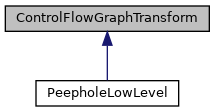Base class for ControlFlowGraphTransform transformations. More...
#include "cfg_transform.h"

Public Member Functions | |
| ControlFlowGraphTransform (const std::shared_ptr< ControlFlowGraph > &cfg) | |
| Constructor. More... | |
| std::shared_ptr< ControlFlowGraph > | get_orig_cfg () |
| Get a shared pointer to the original ControlFlowGraph. More... | |
| virtual std::shared_ptr< ControlFlowGraph > | transform_cfg () |
| Transform the original ControlFlowGraph. More... | |
| virtual std::shared_ptr< InstructionSequence > | transform_basic_block (std::shared_ptr< InstructionSequence > orig_bb)=0 |
| Create a transformed version of the instructions in a basic block. More... | |
Detailed Description
Base class for ControlFlowGraphTransform transformations.
This is the preferred way to implement local optimizations. In general, implementations of ControlFlowGraphTransform are intended to be nondestructive, meaning that they return a new result ControlFlowGraph without modifying the original one.
Constructor & Destructor Documentation
◆ ControlFlowGraphTransform()
| ControlFlowGraphTransform::ControlFlowGraphTransform | ( | const std::shared_ptr< ControlFlowGraph > & | cfg | ) |
Constructor.
- Parameters
-
cfg the ControlFlowGraph to transform
Member Function Documentation
◆ get_orig_cfg()
| std::shared_ptr< ControlFlowGraph > ControlFlowGraphTransform::get_orig_cfg | ( | ) |
Get a shared pointer to the original ControlFlowGraph.
- Returns
- the original ControlFlowGraph
◆ transform_basic_block()
|
pure virtual |
Create a transformed version of the instructions in a basic block.
Note that an InstructionSequence "owns" the Instruction objects it contains, and is responsible for deleting them. Therefore, be careful to avoid having two InstructionSequences contain pointers to the same Instruction. If you need to make an exact copy of an Instruction object, you can do so using the duplicate() member function, as follows:
- Parameters
-
orig_bb the original basic block
- Returns
- shared pointer to the new basic block InstructionSequence
Implemented in PeepholeLowLevel.
◆ transform_cfg()
|
virtual |
Transform the original ControlFlowGraph.
- Returns
- shared pointer to the transformed ControlFlowGraph
The documentation for this class was generated from the following files:
- cfg_transform.h
- cfg_transform.cpp